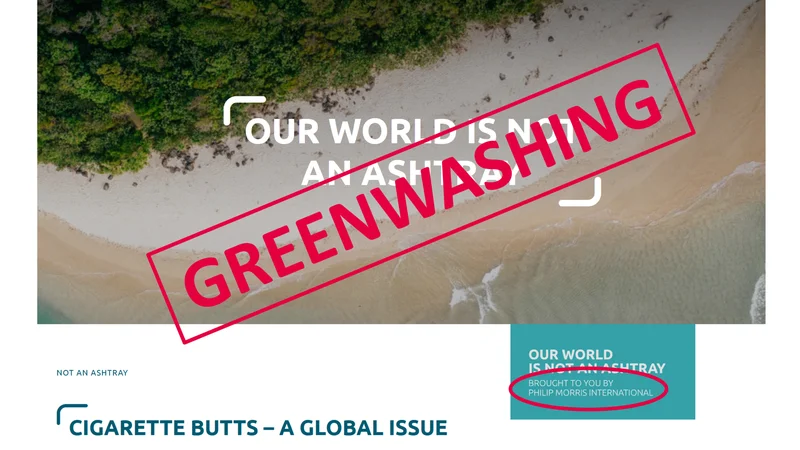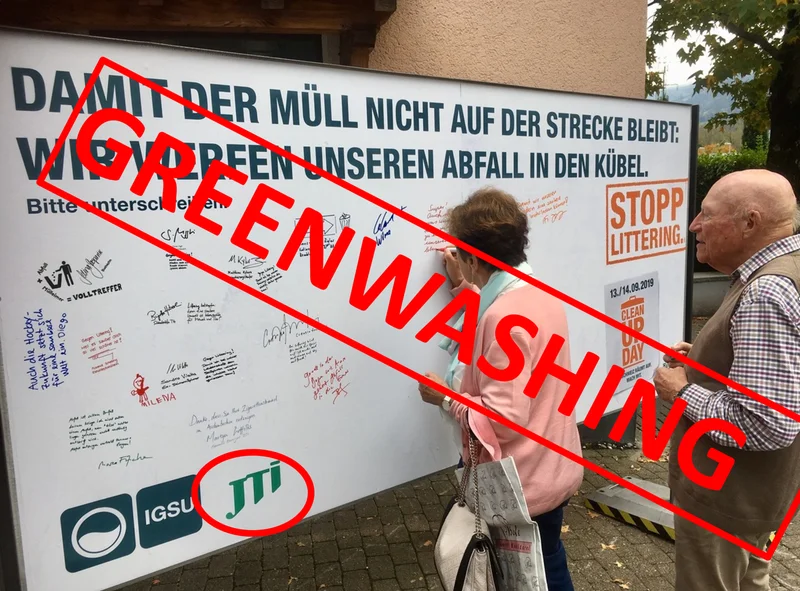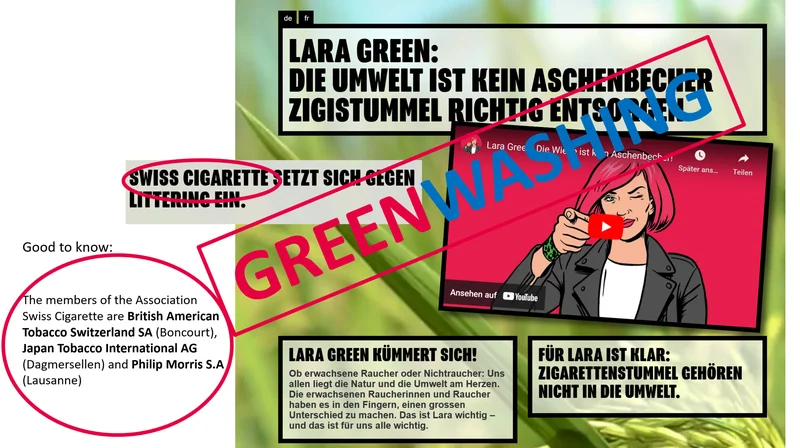When the industry washes greener than green
Faced with the pollution caused by cigarette filters, the tobacco industry seeks to exonerate itself by financing clean-up days and campaigns against littering. It also interferes in the political decision-making process.
Tobacco companies are aware that the mountains of cigarette butts accumulating on sidewalks and in the seas are not good for their image. This encourages them to adopt cosmetic measures focused on the management of this waste. “They hope this will spare them more dramatic punitive measures and substantive interventions to reduce the number of smokers,” notes Thomas Novotny, a public health and environmental specialist at the University of San Diego (US), who focuses his research on tobacco.
Philip Morris International (PMI) launched a campaign in 2020 entitled, “Our World is not an Ashtray”, with a dedicated website. The site offers information on pollution caused by filters, slick videos of people picking up cigarette butts or turning them into works of art, and links to clean-up days, often co-funded by the industry.[1]

“Keep America Beautiful” and “Keep Britain Tidy” campaigns focused on picking up cigarette butts also receive funding from the tobacco industry. In 2021, PMI provided a seven-figure sum to fund an initiative called, “Get your butt off our streets” in the United Kingdom, in collaboration with the NGO Clean Up Britain.[2] The cigarette giants are also increasing the distribution of disposable ashtrays and the installation of ashtrays in public spaces.
In Switzerland, the Community of Interests for a Clean World and a Better Quality of Life (IGSU) organises a waste collection day every year, particularly targeting cigarette butts. All citizens are invited to participate and in the cities everyone can sign large signs denouncing littering.
At the bottom of these posters, the Japan Tobacco International (JTI) logo appears very small. Supported by the Federal Office for the Environment, these clean-up days are in fact financed by the tobacco industry, in particular by JTI and Swiss Cigarette, the umbrella association of cigarette producers and distributors. In Lausanne, World Clean-Up Day, a citizen initiative that takes place in September, was supported by PMI.
The participation of these actors is rarely indicated in a transparent manner. Delphine Klopfenstein Broggini, Green Party national councilor from Geneva, indeed became trapped. “I was invited to take part in the IGSU clean-up day and then had my photo taken next to one of the panels with the JTI logo,” she says. “It was only later that I understood that it was an event organised by the tobacco industry.”

What all these initiatives have in common is avoiding messages and images that could offend smokers. The slogans are not very confrontational, politely calling on cigarette lovers to dispose of their butts in an ashtray, without stigmatising or blaming them. “Keep America Beautiful,” for example, rejected a message clearly calling on smokers to pick up their trash in favour of a slogan urging them to “think more” before throwing their cigarettes into the environment.[3] The visual materials avoid images of cigarette butts, because smokers find this uncomfortable.
The aim is to gently focus the discussion on smokers and their waste practices to avoid a more general debate on the need to promote smoking cessation or ban filters. “The issue of cigarette butts is systematically presented as being the responsibility of smokers, not the industry,” notes Rosemary Hiscock, a researcher at the Tobacco Control Research Group at the University of Bath (UK), affiliated with the Tobacco Tactics portal. Smokers are portrayed as the only ones at fault and the only ones with the power to do anything about it.”
This strategy also avoids emphasising the lack of effectiveness of beach clean-up campaigns or cigarette butt collection days, which recover only a fraction of the cigarette butts thrown into the environment. A genuine collection policy would not be financially viable.
Another area of action consists of promoting the recycling of cigarette butts and the creation of biodegradable filters. The American company, TerraCycle, which receives funding from tobacco companies, claims that it transforms the collected butts into recycled objects such as public benches, shipping pallets, or ashtrays.[4] They are present in 24 countries.
Similarly, in Switzerland, the SENS eRecycling foundation, which counts Lausanne-based tobacco giant PMI among its supporters, has introduced a recycling system for e-cigarettes and heated tobacco products. PMI has also supported various projects to develop biodegradable filters, such as the California company, Greenbutts, which created a filter made of hemp, cotton, and wood pulp that degrades after a week.[5]
To date, however, these initiatives have not produced the expected results. The SENS eRecycling foundation admits that it only manages to recycle around 5% of single-use e-cigarettes – a figure that could in reality be even lower. PMI, for its part, acknowledges that it has not yet found “a fully biodegradable alternative”, despite more than 10 years of research.[6]
Added to this is the tobacco companies’ financing of numerous "green" initiatives that have no link with the problem of cigarette butts. Commonly referred to as "Greenwashing", their goal is to "divert consumers' attention from the pollution caused by their products,” underlines Thomas Novotny. Between 2014 and 2020, PMI spent more than USD 13 million. In particular, it financed a water access project in Burkina Faso, Mali, and Senegal. British American Tobacco (BAT), for its part, supports reforestation in Brazil and Bangladesh; Imperial Brands supports education in India; and Altria supports the health of waterways in the United States.[7]
The tobacco industry also does not hesitate to intervene directly in the political decision-making process. When the European Union considered banning single-use plastics, tobacco companies attempted to influence the debate by meeting with members of the European Commission's Directorate-General for the Environment and participating in the official consultation process.[8] “Their goal was to avoid a blanket ban on cigarette filters, which are single-use plastics,” says Thomas Novotny.
The resulting directive, adopted in 2019, indeed does not prohibit filters. At most, it recommends warnings on cigarette packets concerning the pollution caused by plastics contained in filters.
It also allows cigarette sellers to participate in “the polluter pays” type of initiatives put in place in the wake of the directive. “This allows them to present themselves as a responsible actor, as part of the solution rather than the problem,” underlines Lilia Olefir, who heads the NGO Smoke Free Partnership and closely observed the negotiations. In France, Italy, Ireland, and the Netherlands, the cigarette butt recovery activity is now administered by an entity set up and financed by the tobacco industry.
In Switzerland, the tobacco industry interfered in the decision-making process through a series of round tables organised by the Federal Office for the Environment (FOEN), to which representatives of the tobacco companies were invited. At least eight have been held since 2008. Meeting notes from the 11 November 2022 session indicate, for example, that executives from PMI, BAT, JTI, and Swiss Cigarette were present.[9]
“Representatives of tobacco control organisations, however, were not invited,” notes Kris Schürch, who co-wrote the Swiss section of the report, “Global Tobacco Index: Interference by the Tobacco Industry”. He underlines the lack of transparency in a process that took place behind closed doors, without public communication.
Questioned on this subject, Rebekka Reichlin, spokesperson for the FOEN, specifies that these round tables were intended to allow “associations and producers to develop together additional measures to combat the littering of cigarette butts, which will be implemented on a voluntary basis.”
The tobacco industry would in fact seek to “sell” the “Lara Green” campaign to the government, launched in 2021 by Swiss Cigarette, whose messages amount to greenwashing, according to the managing director of stop2drop, Markus Dick. “On the Lara Green site, we learn that the rubber contained in car tires pollutes more than cigarette butts,” he says. The general message is that cigarettes do not represent a real problem for the environment.
Added to this are the frequent consultation procedures to which the tobacco industry is expressly invited by the Federal Council. “They are sent in a targeted manner to representatives of tobacco companies, while other actors such as anti-smoking or environmental organisations, are systematically 'forgotten',” notes Delphine Klopfenstein Broggini.

The tobacco industry also can claim 27 “connections” in parliament – 11 politicians from the Swiss People’s Party, 10 from the PRD/PLR, and six from the center. For example, Swiss People’s Party national councilor Gregor Rutz is also president of Swiss Tobacco, the association of tobacco product retailers.
Several of these connections provided lobbyist badges to representatives of BAT, Swiss Cigarette, or Swiss Tabac.[10] “All this creates a leading voice for the tobacco industry, allowing it to influence the parliamentary debate and the laws that result from it,” concludes Delphine Klopfenstein Broggini.
[1] https://www.worldnoashtray.com/en/
[3] https://www.industrydocuments.ucsf.edu/tobacco/docs/#id=tjvw0053
[4] https://www.terracycle.com/en-GB/about-terracycle/
[6] https://www.pmi.com/sustainability/integrated-report-2019/reducing-plastic-litter
[10] Ibidem